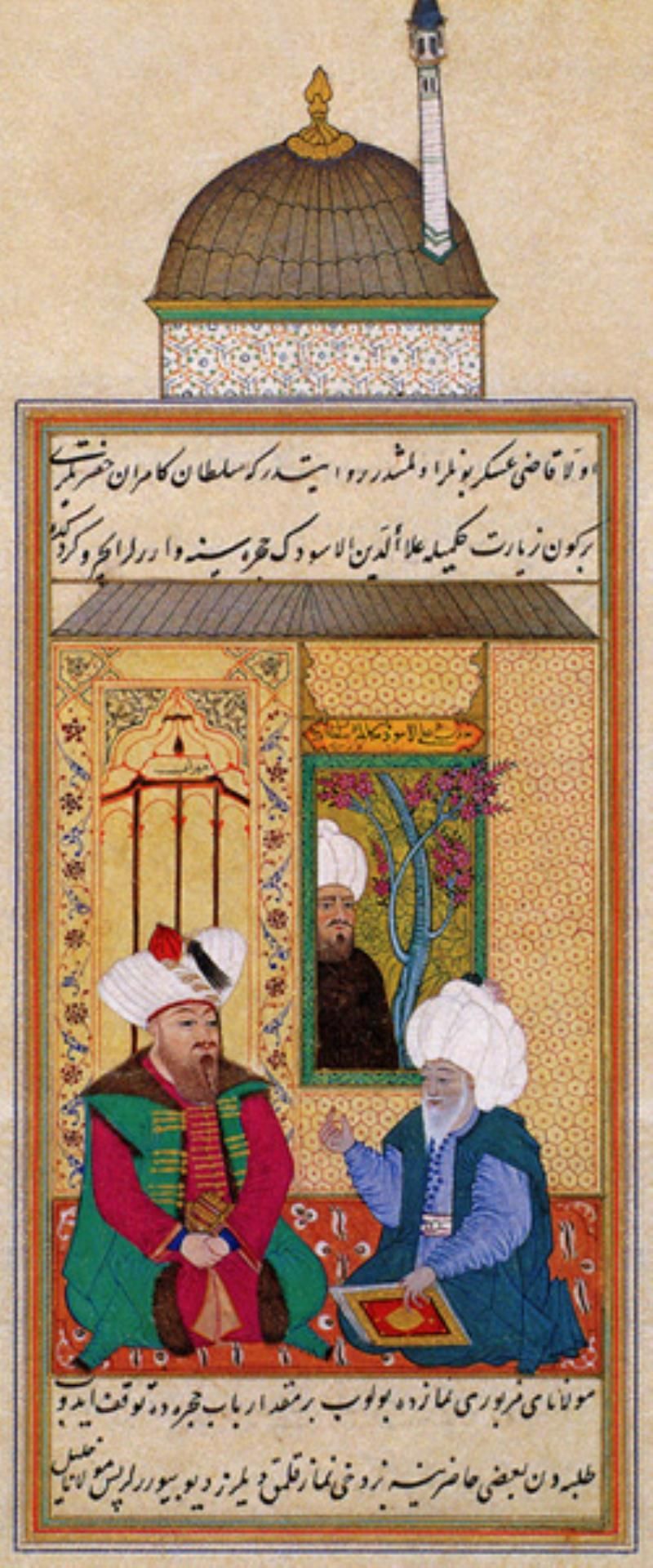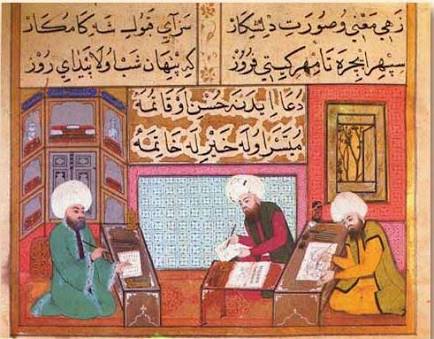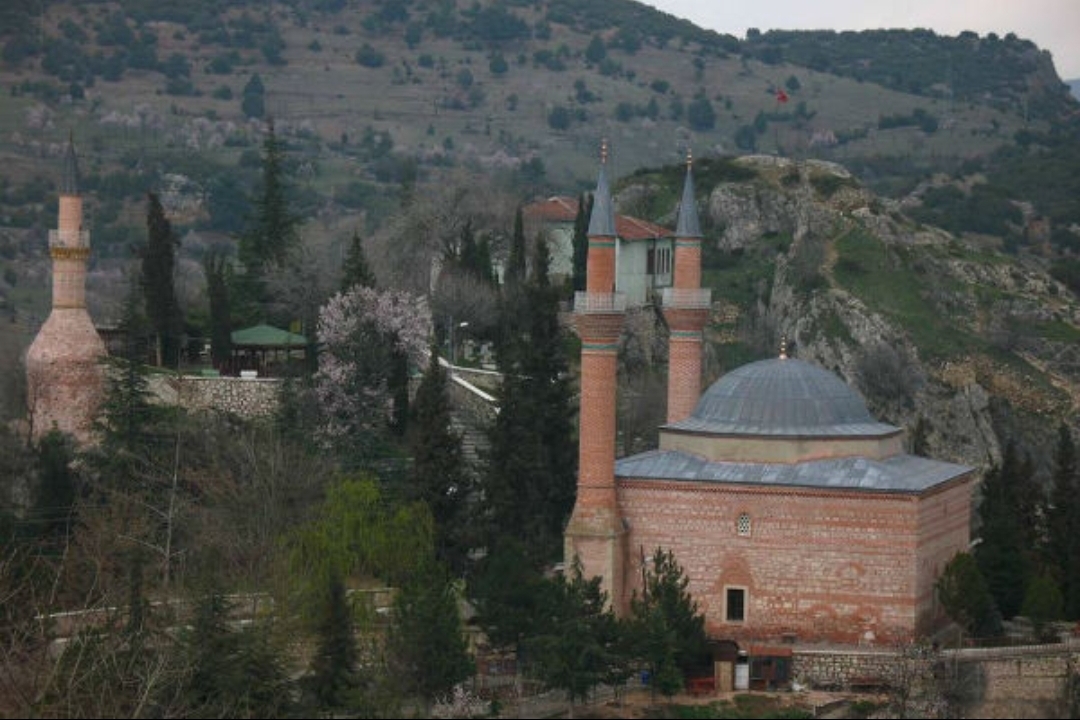.jpg)
THE OTTOMAN EMPIRE HAD ALWAYS BEEN AHLU SUNNAH
Apart from what purpose this claim serves, according to the saying "Once there was none, this rumor just came out", it is not difficult to explain how strange this allegation would be about the Ottoman Empire, whose sole purpose until its collapse was to serve the Ahlu Sunnah and to preserve this belief.
Janissaries-Bektashism
The rumors about the role of Haji Bektash Wali in the establishment of the Janissary Corps are the main basis for this claim. Any connection between the two is impossible. First of all, Haji Bektash Wali passed away in 1271. The Janissary corps was established either during last period of Orhan Ghazi or in the early days of Sultan Murad I.
The statement in Kanun-ı Yeniçeriyan (the laws and regulations of the Janissary Corps) that the law regarding the gathering of young cadets was made by the vote of Timurtaş Dede, one of the sons of Haji Bektash Wali, and the vizier Bektaş Pasha, must have led to this false rumor.
However, the Ottoman government aimed at the dominance of the Islamic Sufi culture in the corps to always remind them of the sacred mission of spreading the name of Allah on earth (ilaa al-kalimatullah), instead of glory, honor, land, booty and captives. A tariqa sheikh (a spiritual leader of an order of Sufism) served at the corps.

Orhan Ghazi with Mawlana Ala al-Din Aswad
Haji Bektash Veli
As it is understood from the works of Haji Bektash Veli and the menakıbnames (works about the extraordinary life stories of walis) written by his members, he had nothing to do with Shiism. The fact that today's Alawis embrace him and his followers does not change this truth.
Lokman Parende, one of the caliphs of Ahmed Yesevi, is a disciple of Haji Bektash Veli. Even though walis who lived in this period, such as Geyikli Baba, Dôlu Baba, Postinpuş Veli were Bektashis, they were Ahlu Sunnah.
Like some other tariqas, Bektashism gradually deteriorated under influence of Shia with the propaganda of Hurufis and Safavid da'is (inviters). It is not possible to say this for every Bektashi lodge. However, this deterioration also affected the janissary corps. Established as the protector of the Sunni faith, the corps had lost this characteristic especially since the 18th century.
As is the case today, the intemperance or ignorance of some disciples cannot be attributed to the tariqas they belonged to. As a matter of fact, bureaucrat and historian Cevdet Pasha says in Qisas al-Anbiya and Tawarih al-Khulafa (Tales of the Prophets and the Caliphs), "No matter how pure a river is, garbage flows along with it. Even though the vagrants, who came to Anatolia and mingled with the ulama (Muslim scholars) and the walis, tried to distort the opinion of the people by disguising themselves as dervishes and abusing the principles of Islamic Sufism. Nevertheless, special officers were appointed during the time of Orhan Ghazi, and madrasahs and lodges were always inspected. These people were driven out of the country."
It is clear that those who want to change the religious concept and reform the religion under the motto "Turkish Islam" rely on these claims.

Ottoman madrasa
Sheikh Edebali
Sheikh Edebali (Mawlana Omer bin Ebu al-Qasim al-Karahisari) was educated by Hanafi faqih (scholar of Islamic law) Najam al-Din al-Zahidi in Karaman and by prominent Sunni scholars of the time such as Sadr al-Din Suliman ibn Ebu al-İzz and Jamal al-Din Hasiri in Damascus. He also got spiritual enlightenment (fayz) from the the Wafa'i tariqa (Wafa'iyya). He is the teacher and father-in-law of Osman Ghazi and the first mufti of the Ottoman Empire. The claim that Sheikh Edebali was actually Shia is quite preposterous.
The founder of the Wafa'i tariqa is an Ahlu Sunnah scholar named Abu al-Wafa al-Baghdadi, who died in Baghdad in 1107. This tariqa spread in Iraq, Syria and Anatolia and was also popular among some Turkmen tribes. Ebu al-Beqa Baba İlyas, one of the Wafa'i caliphs (successor), came to Anatolia from Khorasan in the 18th century and settled in Amasya and established a strong authority among the Anatolian people.
One of his disciples, Baba İshak, who was a Greek boy from Karaman or Kefersud (Malatya), became besotted with establishing an independent administration in the old Greek lands against the Seljuk Empire. He launched a rebellion in Southern Anatolia, using the name of his teacher Baba İlyas, even introducing him as the Mahdi with the name Baba Resul, deceiving the naive people and Greeks.
Even though Baba İlyas sent word and advice to his so-called disciple, he could not make him listen. This time he prayed for his defeat. Baba İshak was defeated and killed by the Seljuk imperial forces. This is known as the Babai revolt. Baba İlyas, who was treated as a criminal even though he had nothing to do with the rebellion, was also arrested. He was imprisoned in Amasya Castle. He was subsequently executed.
As a matter of fact, his grandson, historian Aşıkpaşazade, describes the events in this way. Just as there is no tariqa called Babai, Baba İlyas is not a Rafidi dede (religious leader of those who rejects the first two caliphates) as described in some modern works. In that case, is it reasonable to think that Sheikh Edebali (d. 1326) was also a Shia due to the Babai incident that took place a hundred years ago?

A photo of Sheikh Edebali Complex in Bilecik
Fuqaha
It was not only the Yesevi dervishes called Khorasan walis who played a role in the establishment of the Ottoman Empire. The role of fuqaha (faqihs, scholars of Islamic law), especially Sheikh Edebali, cannot be underestimated. Tursun Faqih was son-in-law of Edebali and brother-in-law of Osman Ghazi. He is the second mufti and first qadi of the state.
Many Sunni ulama such as İshak Faqih, Osman Yahshi Faqih, Mawlana Taj al-Din Kurdi, Mawlana Davud al-Kayseri, Cendereli Mawlana Kara Halil played significant roles in the establishment of the state. They were educated in Egypt, Damascus, Karaman, Konya, Niğde, Bayburt, Diyarbekir, Kayseri and other Sunni towns. Orhan Ghazi established the first Ottoman madrasa in İznik and appointed Davud al-Kayseri as a professor.
Three Classes
The sociological structure of the people in the Seljuk and Ottoman periods consisted of three classes: settled, semi-nomadic and nomadic. Turkmens who settled in cities and villages and semi-nomads adhered to a firm Sunni belief and practice. The conversion of the Turks to Islam had begun in the 700s and was almost completed in the 10th century. Until the emergence of Safavidism, they had no social relations with Shiism.
On the contrary, since the Seljuks, the Turks had struggled with the Shia sects, especially the Buyids, who had captured the Abbasid caliph. This placed Turkishness in the position of natural protector of the Ahlu Sunnah. For the Ottomans, representing a well-known community with this position, it is rather ridiculous to say "First they were Shia, then they became Sunni for political reasons".
However, since the nomads, who had not settled yet, were deprived of religious knowledge in terms of social conditions, some ancient religious beliefs and traditions continued to exist among them and were easily deceived with the propaganda of Iranian agents. It is quite wrong to accept these communities, which had no role in social and political life, as the basis of Ottoman society.
3 Uthmans, 2 Muawiyas
The Ottoman Empire got its name from its founder, Osman Ghazi. Osman (Uthman) is a name Shiites never give their children. Since those who support this claim know this, they say that this name was originally Otman and was later changed to Osman.
The fact that Europeans use the name Ottoman was considered by them as evidence. However, the name Osman is clearly visible on the coins of Osman Ghazi and Orhan Ghazi that we have today. Besides, what can be said about the name of the 4th and 8th sultans being Bayezid? Bayezid is derived from Abu Yazid and refers to Caliph Muawiya.
Entities other than Ahlu Sunnah were fought not only after Sultan Selim but also before him. Börklüce Mustafa and Torlak Kemal revolts were suppressed during the reign of Mehmed I (Mehmed Çelebi).
The Hurufis, who were from the Ghulat Shia (an extreme branch of Shiism) and believed that the Qur'an al-karim had an esoteric meaning learned through letters, were neutralized by Mehmed II (Fatih Sultan Mehmed).
If these Shia sects had been dominant in the early days of the state, how would it have been possible for the state to fight them? How would it have become a state policy all of a sudden, especially during the reign of Yavuz Sultan Selim? Indeed, the answer is very obvious.
Önceki Yazılar
-
"WOE TO THE ENEMIES OF THE REVOLUTION!" What Was The People’s Reaction To The Kemalist Revolutions?2.07.2025
-
DEATH IS CERTAIN, INHERITANCE IS LAWFUL!25.06.2025
-
THE SECRET OF THE OTTOMAN COAT OF ARMS18.06.2025
-
OMAR KHAYYAM: A POET OF WINE OR THE PRIDE OF SCIENCE?11.06.2025
-
CRYPTO JEWS IN TURKEY4.06.2025
-
A FALSE MESSIAH IN ANATOLIA28.05.2025
-
WAS SHAH ISMAIL A TURK?21.05.2025
-
THE COMMON PASSWORD OF MUSLIMS14.05.2025
-
WERE THE OTTOMANS ILLITERATE?7.05.2025
-
OTTOMAN RULE BENEFITED THE HUNGARIANS30.04.2025